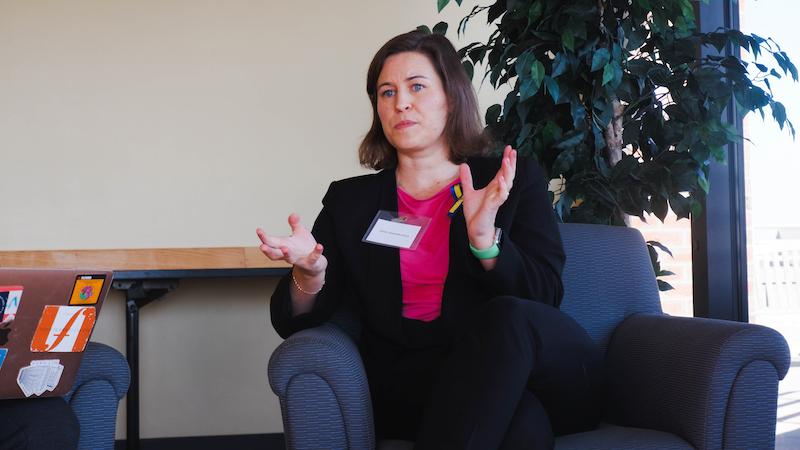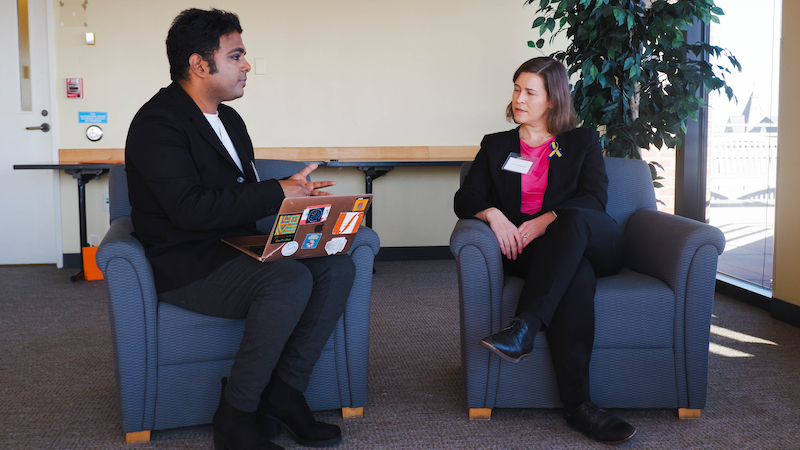
Interview with Emily Channell Justice on the Feminist Anti-War Movement in Russia and LGBTQIA+ Rights
By Vishal Manve, MALD 2023 Candidate, The Fletcher School
On November 19, 2022, The Fletcher School hosted the annual Conference on Gender and Intersectional Analysis. The conference held multiple panels spotlighting the women-led protests in Iran; the Russian invasion of Ukraine and its impact on women, children, and LGBTQIA+ groups; the politicization of abortion rights in the U.S.; and local advocacy.
For the session “Existence Is Your Resistance: Culture Wars on LGBTQIA+ Communities,” speakers included Tunisian queer activist Khookha McQueer, Fletcher alumna and U.N. Women representative Claire Wilson, drag performer Mani Soma, and Emily Channell-Justice, director of the Temerty Contemporary Ukraine Program at Harvard Ukrainian Research Institute (HURI).
The Fletcher Russia and Eurasia Program’s Vishal Manve spoke to Professor Channell-Justice on the gendered and humanitarian aspects of the Russia-Ukraine war, its impact on children, and what the global community could do to protect children and women in a war-torn region. Below is an edited transcript of the interview.
VM: What is the current status of women, children, and LGBTQIA+ groups caught in the crossfire of the Russia-Ukraine war?
ECJ: Russia has focused its attacks on Ukraine’s energy infrastructure with the idea of making it inhospitable to live in Ukraine and thereby breaking their spirit. In terms of gender impact, a large number of refugees are women and children. That’s because the martial law that was imposed in Ukraine after February 24, 2022 ensured that only women and children could leave the country, and men stayed back for territorial defense. Many women stayed back for volunteering and humanitarian work, but a vast majority of displaced people both inside and outside of Ukraine were women and children.
The concerns and questions for LGBTQIA+ individuals have been a bit different. LGBT people are part of the Territorial Defense Brigade in Ukraine, which is an amazing development. But as the war raged on, many people decided to leave Ukraine partly because they were really fearful of what Russia could potentially do if it took over Ukraine. We know Russia is very hostile to LGBT and queer folks in comparison to Ukraine. While the conditions are not ideal in Ukraine, there is acceptance, which is very different in Russia. The fear of a crackdown is very real for LGBTQIA+ Ukrainians, and despite visibility, there still exists homophobia in Ukraine. Many LGBT community members left. There were a few receiving countries that specifically had LGBT networks and received them. My friends left Warsaw and knew trust networks, which helped a lot in escaping dangerous situations.
Unfortunately, we have a lot of evidence of gender-based violence as part of war crimes and atrocities that are being documented out of liberated regions. As more places are liberated, we are receiving more horrific reports about the war crimes, and this has been a tactic that Russian soldiers have been encouraged to use.
VM: What can the international community do currently to address these developments?
ECJ: With sanctions, the effects are in the longer term and we are starting to see some of those effects now [more] than in the beginning. From what I can understand, there exist more intersections. This means increasing sanctions on Iran for supplying Russia with drones. That’s a great next step. The U.S. Congress is looking at different aspects, and wants to recognize what Russia is doing in Ukraine as genocide, which triggers the obligation of other countries to prevent it. This means more military aid for Ukraine and can help in putting an end to the war. The other thing being asked is to declare Russia as a terrorist state, which is difficult and does not happen very often or commonly, but would allow for the seizure of Russian assets that have not yet been seized. This can then be used to rebuild Ukraine and deals with questions of rebuilding, reparations, and justice. This is something to look forward to as we move further along. Obviously, there needs to be a cessation of hostilities from the Russian side in order to really address that rebuilding process.
The main question concerns energy infrastructure, and that’s what allies need to focus on–ensuring the continuous functioning of power without shutting down defense infrastructure. Even on a smaller scale, we need to ensure power generators function and the hospitals can function without any interruptions. These factors will be essential for Ukraine to survive the harsh winter.

VM: Could you illustrate how Russia perpetuates violence against minorities and its own citizens as a by-product of the war, and how these models are used by other authoritarian regimes in the region?
ECJ: It’s interesting and important to analyze the consolidation of the state power under Putin. He has consolidated the media, so we end up with a really tight economic elite that will lose everything if they voice their opinions against him or challenge him. Therefore they don’t challenge him. Furthermore, we have a media machinery that convinces the population that they need Putin to survive and that everyone else is against them. It is a narrative that everyone else is trying to bring Russia down and we need Putin to save us. Russia has the internet and people are smart [enough] to use VPNs, so there is no excuse for not knowing better. A small anti-war movement exists in Russia and feminists are a central part of it, and it is an underground movement. They are opposing the regime, facing the burden, and helping people escape to Europe to be with their families.
Another incredible thing was when Russia started its mobilization for conscription in largely far-off regions that were colonized by the Russian empire in the Soviet Union, there was a clear racial hierarchy that showcased how Russia viewed these conscripts as disposable as compared to the middle-class Russians in Moscow. There were women-led movements against these conscriptions in four regions, and authorities did not know how to react. Because in a society as traditional as Russia, the perception is that the state should protect women, not attack them. In these cases, women are pushing back against traditional gender roles, but due to geographical and ethnic hierarchy, these might not go anywhere in terms of changing things for the majority in Russia–but they are still very important. It gives an important message about autonomy and what risks are these groups willing to take to fight for these rights, despite knowing very well they could face a prison term of 15 years. It takes a lot of courage.
VM: Could you talk about the role of organizations, and anti-Kremlin groups in protesting against the Russian invasion of Ukraine and illustrate more about the violence faced by women?
ECJ: For the most part, Putin has no motivation to even accept that these groups exist. I will be critical here and believe they have not done enough to push back against the state as they purport to have done. They are not leading an anti-war movement either inside or outside Russia. One thing that we have seen after the mobilization drive and exodus of Russians was their failure to mobilize outside Russia. There have been no major anti-war protests and there is no excuse for it. In Russia, they said they would face jail terms, but right now they are in a country that does not punish protests. So, I am not sure why they are not on the streets with anti-war protests, and why have the Russian opposition leaders not taken up the mantle in a major way. I have not seen major anti-Kremlin groups at any protests; I am aware of the risks they are facing but there has been no visibility. It just showcases there is no substantive opposition in Russia and leaves room for speculation. The worst version is that even the people who oppose the regime the most still do not see Ukraine as a sovereign country. They still see Ukraine as part of Russia. This might not be the case, but since they don’t present their positions, it leaves room for such questions.

VM: Can you talk about your work with the Temerty Contemporary Ukraine Program and your work on “Decolonizing Queer Experience: LGBT+ Narratives from Eastern Europe and Eurasia”?
ECJ: The idea of the book focused on decolonizing queer experiences, with an edited volume of nine chapters from all across the world. I conducted my research and engaged with left and feminist activist groups in 2012 and finished in 2014.
After the Euro Maidan protests, the focus shifted to the Europeanisation of Ukraine, and a few of the people in the circles that I worked in started coming out and publicly identifying as LGBT or queer, and they had allies in that community. I wanted to interrogate whether or not leftist groups were predisposed to support LGBT rights or whether it was based on knowing them beforehand. The idea of the book was to highlight some of the stories that were about everyday life, not necessarily about activism in the streets all the time.
My current research is about forced displacement. I was working on the issue of displacement in the context of war at the end of 2014. I got interested in how queer folks were experiencing displacement after February 24, 2022. But I have yet to manage substantive research on it because of the risk component involved for the queer groups.
